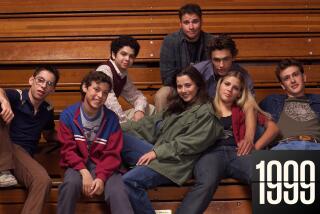It’s no lunatic ‘Fringe’
NEW YORK — Anna Torv isn’t so big on gore.
But on a recent summer evening, the Australian actress, who plays FBI Special Agent Olivia Dunham on Fox’s highly anticipated new drama “Fringe,” was peering down at a fleshy, mottled heart lying on a metal examination table on the set of a gloomy basement laboratory. Suddenly, the organ jolted to life, sending red rivulets spurting into the air.
Looks like Torv better get used to working with blood and guts.
If the first glimpses of “Fringe” are any indication, the sci-fi mystery is unstinting in its portrayal of the havoc caused when science runs amok. In tonight’s premiere, Dunham and her partner, John Scott (Mark Valley), are called in to investigate when an international flight mysteriously lands in Boston with all of the crew and passengers on board dead. The victims are unrecognizable, their faces twisted masses of flesh and bone.
“I want her to vomit one time when she sees one of these things, because I think she would legitimately feel that way,” Torv said laughingly of her character.
“Fringe’s” embrace of the gruesome comes as it explores the ramifications of the outer reaches of science. Thrust into a maelstrom of bizarre events, Dunham seeks answers from Dr. Walter Bishop (John Noble), a brilliant scientist who was institutionalized for 20 years after one of his experiments went awry. To get Bishop on board, she’s forced to recruit his reluctant and estranged son, Peter, played by Joshua Jackson.
Together, the often quarrelsome trio investigates a pattern of odd phenomena that seem to defy scientific principles.
“What I love about the show is [the question of] the conspiracy, the retention of knowledge,” said Torv, who is making her American debut with the show. “Who really has that, and who has the power? If they’re telling us they’re able to clone a sheep, if that’s OK for us to know, you go, ‘Come on, what else are they doing?’ ”
The premise may sound familiar, but the show’s creators insist that “Fringe” is not “The X-Files” circa 2008.
“There are obviously fair comparisons,” admitted executive producer J.J. Abrams, the writer behind hits such as “Lost.” “It’s definitely federal agents investigating a lot of crazy, scary stuff. But ‘Fringe’ differentiates itself very quickly in terms of different characters and tone, and the overall story could not be more different.”
The sci-fi thriller came about as a “planned pregnancy,” said fellow executive producer Roberto Orci, who developed the drama with Abrams and Alex Kurtzman. “We sat in a room and said, ‘Let’s create a show.’ ”
The next several months resembled a graduate seminar on television, as the three men -- who worked together on the ABC spy thriller “Alias” and the upcoming “Star Trek” movie -- dissected their pop culture passions. The final product reflects their influences: not only “The X Files” but also “Twilight Zone,” “Night Stalker,” “Twin Peaks” and the 1980 movie “Altered States.”
“We asked ourselves, what did we as viewers feel was missing from television?” Kurtzman said. “The answer was, ‘Where is the procedural that’s rooted in genre?’ It felt like there was a vacuum to fill.”
But balancing a weekly investigation with an overarching mystery was the tricky part. The writers were all too familiar with the risks of serialized storytelling from their time on “Alias,” in which convoluted plots proved impenetrable to many viewers.
“It wasn’t just if you missed an episode you were lost,” Kurtzman said dryly. “If you missed an act, you were lost.”
Abrams, whose island mystery show “Lost” tried to navigate the balance between unspooling story and offering resolution, was determined that “Fringe” would be “a show that people can watch as frequently and as infrequently as they want to.”
“I just feel like, as an experiment, can we do a show that deals with ongoing character and a larger mythology and a big picture, and yet do it in a way that allows it to be a fun experience and not so much work if you miss one?” he said.
The first key, they decided, was to settle on the ultimate answer to the mystery driving the main characters: Who -- or what -- is causing these strange occurrences?
“For us, the fun is the question, ‘Is it a grand conspiracy, or is it nature reacting?’ ” Orci said. “Often you’ll see episodes that support multiple theories.”
The premiere introduces viewers to a mysterious corporation called Massive Dynamic, which was founded by Walter Bishop’s old lab partner. Could it be behind the strange pattern of events?
Abrams said the direction the show takes will surprise viewers.
“It’s much less a ‘GE-is-evil’ kind of story line, and much more personal,” he said.
The intersection of science and mystery imbues “Fringe” with provocative questions about the ethical implications of scientific advancement.
“Human science has progressed to a place where we’re doing things that previously were only the domain of supernatural powers,” said Jackson during a break outside “Fringe’s” studio in Queens. “We have the thirst for knowledge, but it can be both beneficial and really disruptive. And what do you do when you’re dancing with that Promethean light? You want to reach out and touch it, but you know it’s going to burn you.”
Unlike its paranormal progenitors, “Fringe” attempts to stay rooted in science that is within the realm of current human achievement.
The writers draw ideas from a large research database of journal articles about the newest experiments and discoveries.
“I think a lot of the science is beyond us technically at this stage but not beyond our imaginations,” Noble said between shooting scenes for the fifth episode, in which a man inadvertently triggers electronic outages with his internal electromagnetic field.
Fox has spared no expense trying to generate its own buzz about the drama, rolling out a massive promotional effort. In a sign of the stakes, the network handed “Fringe” a key time period: 9 p.m. Tuesdays, after the popular series “House.”
For the creators, the public expectations have only compounded their own anticipation about “Fringe’s” premiere.
“We’re just counting ourselves as lucky,” Orci said. “We have no one to blame but ourselves if this doesn’t work.”
--
More to Read
The complete guide to home viewing
Get Screen Gab for everything about the TV shows and streaming movies everyone’s talking about.
You may occasionally receive promotional content from the Los Angeles Times.






